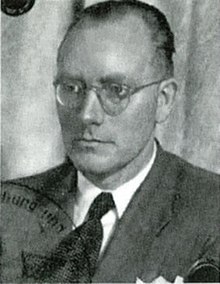Rudolf Wolters | |
|---|---|
 Nazi era ID photo | |
| Born | 3 August 1903 |
| Died | 7 January 1983 (aged 79) Coesfeld, West Germany |
| Alma mater | Technische Universität Berlin |
| Occupation | Architect |
| Buildings | Industrie-Kreditbank building, Düsseldorf; Hotel Königshof, Bonn |
| Projects | Reconstruction of Coesfeld after World War II |
| Design | Prachtstrasse (North–South Axis), Nazi plan to reconstruct Berlin |
Rudolf Wolters (3 August 1903 – 7 January 1983) was a German architect and government official, known for his longtime association with fellow architect and Third Reich official Albert Speer. A friend and subordinate of Speer, Wolters received the many papers which were smuggled out of Spandau Prison for Speer while he was imprisoned there, and kept them for him until Speer was released in 1966. After Speer's release, the friendship slowly collapsed, Wolters objecting strongly to Speer's blaming of Hitler and other Nazis for the Holocaust and World War II, and they saw nothing of each other in the decade before Speer's death in 1981.
Wolters, who was born to a Catholic middle-class family in the northern German town of Coesfeld, obtained his degree and doctorate in architecture from the Technische Hochschule in Charlottenburg (now Technische Universität Berlin), forging a close friendship with Speer while a student. After receiving his doctorate, he had difficulty finding employment prior to the Nazi rise to power. From 1933 to 1937, he worked for the Reichsbahn. In 1937, Speer hired him as a department head, and Wolters soon took major responsibility for Hitler's plan for the large scale reconstruction of Berlin. When Speer became Minister of Armaments and War Production in 1942, Wolters moved to his department, remaining his close associate.
After Speer's indictment and imprisonment for war crimes, Wolters stood by him. In addition to receiving and organizing Speer's clandestine notes from Spandau, which later served as the basis of his best-selling books of memoirs, Wolters quietly raised money for Speer. These funds were used to support Speer's family and for other purposes, according to directions which Wolters received from his former superior. Following Speer's release in 1966, their friendship gradually deteriorated, until the two men became so embittered that Wolters allowed papers demonstrating Speer's knowledge of the persecution of the Jews to become public in 1980.
Wolters was involved in the reconstruction of West Germany following World War II, rebuilding his hometown of Coesfeld among many other projects. Wolters wrote several architectural books during the war, as well as a biography of Speer.